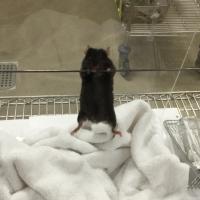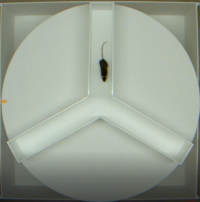 Jon Ramsey, PhD, - Project Lead
Jon Ramsey, PhD, - Project Lead
Professor, Vet Med: Molecular Biosciences
jjramsey@ucdavis.edu
530-754-8122
https://www.vetmed.ucdavis.edu/faculty/jon-ramsey
Dr. Ramsey training and research interests are in the area of nutrition, aging and bioenergetics. I have experience performing studies that determine the impact of diet on life span, health span, and energy metabolism. I received my doctoral training in animal energetics at Colorado State University, and I gained experience with whole animal (indirect respiration calorimetry) and mitochondrial measures of energy metabolism. As a post-doctoral fellow at the University of Wisconsin, I received training in the study of nutrition and energy metabolism as it relates to aging and calorie restriction. My research interest continues to focus on the role nutrition and energy metabolism plays in aging. I have established a laboratory that routinely measures life span, whole animal energy expenditure (indirect respiration calorimetry), motor function, cognitive function, mitochondrial function, and the activities of key enzymes of intermediary metabolism. I am also the Core Leader of the UC Davis Mouse Metabolic Phenotypic Center Energy Balance, Exercise and Behavior Core. As Principal Investigator on several industry, university and NIH-funded grants, I have experience successfully administering research projects, collaborating with other investigators and producing peer-reviewed publications.
Project Summary:

We demonstrated for the first time that life span is increased and several functional parameters, including memory and motor function, are significantly improved in late life in mice fed a ketogenic diet (KD) in isocaloric amounts to a CTL diet. These increases in longevity and healthspan occurred in mice that were started on the KD diet in middle age and did not differ in weight compared to the control mice. The proposed studies will build on this work and take a critical step toward determining the duration and periodicity of ketosis required to increase healthspan. The studies will also determine if less restrictive dietary strategies than continuous feeding of a KD provide a route to improve physiological function in late life. We propose to test the influence on aging of intermittent KDs (iKD) and dietary ketone supplements. These dietary approaches are intended to mimic the periodic ketosis that occurs with calorie restriction and intermittent fasting.

We hypothesize that diet strategies (iKD or KS) which induce intermittent, brief periods of ketosis will increase health span and longevity without requiring weight loss in wild-type mice and a mouse model of Alzheimer’s disease. We propose three specific aims to test the hypothesis: 1) To determine if iKD feeding strategies that induce brief periods of ketosis (KD fed three days spread throughout the week or three consecutive days during the week) increase health span and longevity in mice; 2) To determine if dietary supplements that increase blood ketone levels (caprylic and capric acids or a ketone ester) will increase health span and longevity in mice; and 3) To determine if intermittent feeding of a KD alters disease progression in the PSAPP mouse model of Alzheimer’s disease. These studies will take a necessary step toward determining if intermittent consumption of a KD or dietary supplements that increase blood ketone levels offer a viable approach to increase functional life span.